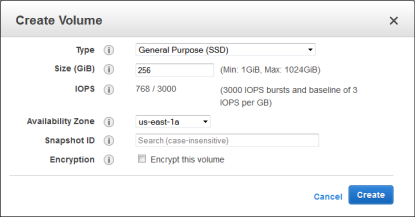AWS News Blog
Enhanced Throughput for Provisioned IOPS (SSD) and General Purpose (SSD) EBS Volumes
Back in the old, pre-cloud days, updating your data center to use the latest and greatest hardware was expensive, somewhat risky, and resource intensive. You would have to make the capital investment to acquire new hardware based on your usual 3 or 5 year refresh cycle, field test it, and then migrate your systems and applications. The time between “I saw this cool thing and it could benefit our work” and “we are using this cool thing and it is benefitting our work” was often measured in quarters or years. Delays or inefficiencies in this process have the potential to affect the competitive position, health, and overall viability of your organization.
As I have said before, the cloud changes this model for the better. First of all, your cloud provider has an incentive to bring the newest and most powerful technology to market on a timely basis. Second, the dynamic nature of the cloud makes it easy for you to launch, test, and measure the performance of your existing applications on the new technology without disrupting your production systems.
General Purpose (SSD) Adoption is Strong
I would like to share some interesting numbers with you that illustrate the game-changing nature of the Cloud. In mid-June we announced SSD-Backed Elastic Block Storage and made it available in all AWS Regions. We knew that our customers would find this new offering attractive but we were not quite sure (despite plenty of market research and modeling) just how popular it would turn out to be.
 In less than three months, the General Purpose (SSD) EBS storage has grown to the extent that it is now one of the fastest adopted services in the history of AWS! Here are two data points:
In less than three months, the General Purpose (SSD) EBS storage has grown to the extent that it is now one of the fastest adopted services in the history of AWS! Here are two data points:
- Within a few weeks of the launch, over 25% of the EBS customer base was already making use of the new General Purpose (SSD) EBS volumes in some way.
- Today, most of our customers are now using General Purpose (SSD) volumes to meet their need for general purpose block storage. In fact, about 90% of the newly created block storage is now on SSD volumes.
Looking at this another way, the easy and capital-free migration made possible by the cloud has allowed the vast majority of our customers to move to a new generation of storage in a little over two months. Any way you look at it, this is a rapid upgrade cycle!
Throughput Enhancement
To celebrate this huge step forward (and because we love to innovate), we are improving data transfer throughput for General Purpose (SSD) and Provisioned IOPS (SSD) volumes. Here’s what’s new:
- The maximum attainable throughput to each volume has been doubled. Each General Purpose (SSD) and Provisioned IOPS (SSD) volume can now sustain up to 128 megabytes per second of read or write traffic.
- An I/O request of up to 256 kilobytes is now counted as a single I/O operation (IOP). In other words, a single IOP is now up to 16 times as cost-effective and performant as before (prior this enhancement, each IOP represented at most 16 kilobytes of data transfer). If you attach multiple General Purpose (SSD) or Provisioned IOPS (SSD) volumes to a single c3.8xlarge EC2 instance you can achieve up to 800 megabytes per second of aggregate throughput per instance.
These changes will improve your I/O performance and can also dramatically reduce your storage costs. If your application has a need for 128 megabytes per second of data transfer, you can now meet this need by provisioning 500 IOPS instead of 8000 IOPS.
As I noted above, an I/O request for up to 256 kilobytes is now counted as a single I/O operation. In some cases you can configure your application or your operating environment to make large read and write requests. For example, you can configure the size of requests made by Hadoop by altering the dfs.blocksize parameter. If you are building your own applications, you can read or write large blocks.
As part of this launch we have also updated the EC2 AMIs for Microsoft Windows. The new AMIs (“2014.08.13”) will use SSD volumes exclusively and have an updated PV driver for increased performance. The Microsoft Security Updates are current to August 2014, the PowerShell Tools have been updated.
This enhancement is now in effect in all AWS Regions. If you are using General Purpose (SSD) or Provisioned IOPS (SSD) volumes then you are already reaping the benefits. We expect this enhancement to improve performance on many types of I/O-intensive workloads including those which involve database loads and scans across large tables.
— Jeff;